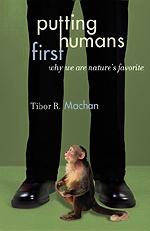Since 1991 I have been arguing about animal rights and liberation. It came about because I wrote a paper, "Do Animals Have Rights?" after learning that a colleague, Tom Regan, had had a book prominently published by University of California Press, The Case for Animals Rights. I had been writing on natural rights theory since I did my doctoral dissertation, and I thought I needed to get straight about this animal rights issue.
My point was, in essence, that rights are just not the sort of things animals other than people could have. Could animals have guilt, be blamed, feel regret and remorse, or apologize or anything on that order? No, and why so, that was the gist of my thesis: they are not moral agents like us, not even the great apes.
If a non-human animal, however evolved, kills, maims or injures another animal of its own kind, we may lament this all we like, but to hold the perpetrator responsible just will not work. Animals are mostly instinctually driven to behave as they do, even if that may involve some slight measure of intelligence and self-awareness. What it does not involve is self-direction by means of free will, self-reflection and self-monitoring, all of what would enable them to initiate their conduct and to be morally responsible agents.
Why do folks like Regan think animals have rights, nonetheless? Because they ascribe rights not on the basis of moral agency but because of a certain level of intelligence.
In nature there aren't very sharp divisions – a child doesn't become an adult at some precise point in time. Especially when it comes to biological entities, we leave off the precision of geometry and algebra. Instead there are areas of more or less grayness, as it were. And that's true about intelligence, too.
Yet this is no justification at all for abandoning the task of sensibly classifying things. And all in all it is human beings who have moral capacities, nothing else we know of, not even animals with some measure of intelligence – which, at any rate, tend to exhibit this intelligence mostly under prodding from human beings who capture them and start manipulating them to extend their smarts.
Yes, matters are more complicated than it was once thought, say by Rene Descartes, the great French philosopher who believed non-human animals were machines!
Recently I penned a book about this topic, Putting Humans First, expanding my earlier paper and developing the idea further to show that environmental ethics, too, is misguided by not recognizing that human beings are at the highest rung of nature and that conduct and public policy need to be forged with that in mind. No, this doesn't mean anything goes – torturing cats is still vicious, disregarding the pain of laboratory or household animals, or cattle or chicken, is wrong. But it doesn't follow that human goals and purposes do not justify our using animals.
Some have begun to take notice of my thesis since very few have gone on record about this – in part perhaps because PETA and other animal activists are not a friendly bunch and most would just as soon stay out of their way. The most telling point against me goes as follows: "But there are people like very young kids, those in a coma, those with minimal mental powers, who also cannot be blamed, held responsible, etc., yet they have rights. Doesn't that show that other than human beings can have rights?"
 This response doesn't recognize that classifications and ascriptions of capacities rely on the good sense of making certain generalizations. One way to show this is to recall that broken chairs, while they aren't any good to sit on, are still chairs, not monkeys or palm trees. Classifications are not something rigid but something reasonable. While there are some people who either for a little or longer while – say when they're asleep or in a coma – lack moral agency, in general people possess that capacity, whereas non-people don't. So it makes sense to understand them having rights so their capacity is respected and may be protected. This just doesn't work for other animals.
This response doesn't recognize that classifications and ascriptions of capacities rely on the good sense of making certain generalizations. One way to show this is to recall that broken chairs, while they aren't any good to sit on, are still chairs, not monkeys or palm trees. Classifications are not something rigid but something reasonable. While there are some people who either for a little or longer while – say when they're asleep or in a coma – lack moral agency, in general people possess that capacity, whereas non-people don't. So it makes sense to understand them having rights so their capacity is respected and may be protected. This just doesn't work for other animals.
One last point. Some fault my approach for not proving with logical certainty that animals have no rights. But that is a mistaken demand – to prove a negative, like asking the defense to prove the innocence of the accused. It's animal rights proponents who haven't made the case for rights of animals, and I merely did some leg work to point that out.
March 15, 2004







